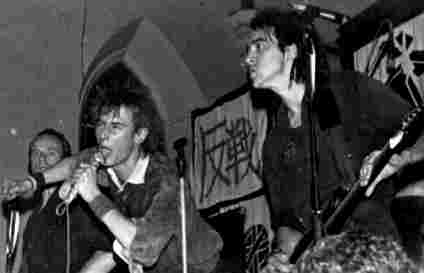| Revision as of 12:04, 9 February 2003 editQuercusrobur (talk | contribs)9,374 editsmNo edit summary← Previous edit | Revision as of 04:45, 24 February 2003 edit undo64.175.250.115 (talk)No edit summaryNext edit → | ||
| Line 1: | Line 1: | ||
| '''Crass''' were a ] band formed in ], based around ], an anarchist community near ] in England. They were progenitors of a militant ] that became pervasive in the punk music scene (see also ]). Taking literally the punk manifesto of ‘anyone can do it’, they combined the use of song, film, sound collage, graphics and subversion to launch a sustained and innovative critical broadside against all that they saw as a culture built on foundations of war, violence, religious hypocrisy and blind consumerism. | '''Crass''' were a ] band formed in ], based around ], an anarchist community near ] in England. They were progenitors of a militant ] that became pervasive in the punk music scene (see also ]). Taking literally the punk manifesto of ‘anyone can do it’, they combined the use of song, film, sound collage, graphics and subversion to launch a sustained and innovative critical broadside against all that they saw as a culture built on foundations of war, violence, religious hypocrisy and blind consumerism. | ||
| ] | ] | ||
Revision as of 04:45, 24 February 2003
Crass were a punk rock band formed in 1976, based around Dial House, an anarchist community near Epping in England. They were progenitors of a militant anarcho-pacifism that became pervasive in the punk music scene (see also anarcho-punk). Taking literally the punk manifesto of ‘anyone can do it’, they combined the use of song, film, sound collage, graphics and subversion to launch a sustained and innovative critical broadside against all that they saw as a culture built on foundations of war, violence, religious hypocrisy and blind consumerism.
Above; Crass pictured at the Digbeth Civic Hall, Birmingham, 1981
Crass all but retired from the public eye after becoming a particularly irritating thorn in the side of Mrs. Thatcher's Government during the Falklands War and the Miners Strike. Questions in Parliament led to a round of court battles and what the group describe as harassment that finally took its toll, and in 1984 the band retreated to Dial House to concentrate their energies elsewhere.
The philosphical and aesthetic influence of Crass on numerous punk bands from the 1980s on cannot be overstated, even if few bands mimicked their often free-form musical style, as evidenced on the album Yes Sir, I Will. Their collage-art black-and-white record sleeves produced by Gee Vaucher themselves became a signature aesthetic model.
Whereas the Sex Pistols' anarchism seemed to be a self-consciously nihilistic prank, Crass's anarchism was more directly linked to the libertarian socialist or communalistic varieties of 20th century political thought.
In November 2002 several former members of Crass collaborated under the name of The Crass Collective to arrange Your Country Needs You, a concert of "voices in opposition to war" held at the Queen Elizabeth Hall on London's South Bank.
Above; Sleeve art for Crass' Feeding Of The 5000 12" single
Crass were
- Penny Rimbaud (drums)
- Gee Vaucher (artwork)
- Steve Ignorant (voice)
- N.A.Palmer (Guitar)
- Phil Free (Guitar)
- Pete Wright (Bass)
- Eve Libertine (Voice)
- Joy De Vivre (Voice)
- Mick Duffield (films)
Discography
(all released on the Crass record label)
- "The Feeding Of The 5000" (12" single, 1978, originally released by Small Wonder Records)
- "Reality Asylum" (7", 1978)
- Stations Of The Crass (LP, 1979)
- "Bloody Revolutions" (single, joint released with the Poison Girls, 1980)
- "Tribal Rival Rebel Revels" (Flexi disc single given away with Toxic Grafity (sic) fanzine)
- "Nagasaki Nightmare" (single, 1981))
- Penis Envy (LP, 1981)
- Christ The Album (LP, 1982)
- "Sheep Farming In The Falklands" (single 1982, originally distrinuted anonymously as a flexi-disc)
- "How Does It Feel To Be The Mother Of 1000 Dead?" (Single 1981)
- Yes Sir I Will (LP, 1983)
- "You're Already Dead" (single, 1984)
- Acts Of Love (LP and book, 1985)
- "Ten Notes On A Summer's Day" (12" single, 1986)
- Best Before 1984 (Retrospective LP compilation, 1986)
Recommended reading
- A Series Of Shock Slogans And Mindless Token Tantrums (Exitstencil Press, 1982) (originally issued as a pamphlet with the LP 'Christ The Album', much of the text is now published online at http://www.southern.com/southern/label/CRC/text/09438a.html )
- Shibboleth- My Revolting Life (Penny Rimbaud, 1999, AK Press)
- The Diamond Signature (Penny Rimbaud, 1999, AK Press)
- Crass Art And other Post Modern Monsters (Gee Vaucher, 1999, AK Press)
- International Anthem- 'A Nihilist Newspaper For The Living' issues 1-3 (Exitstencil Press, 1977-81)
See also
Crass tell their story in their own words at;
